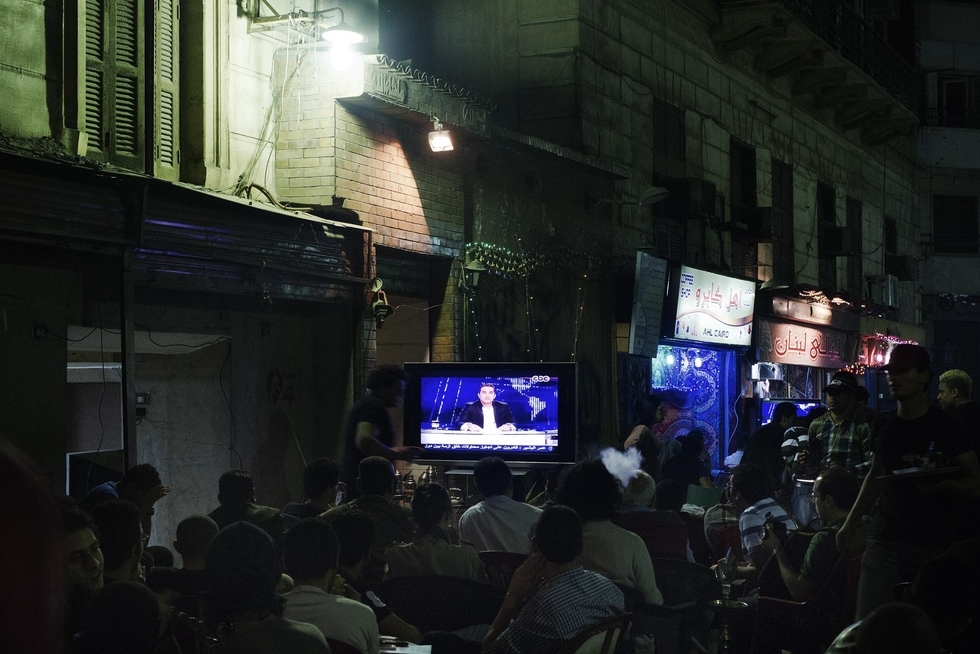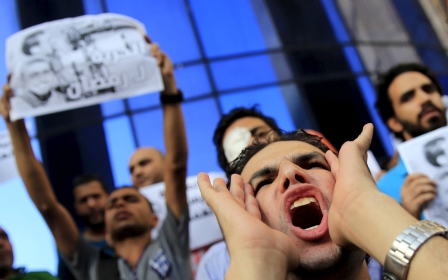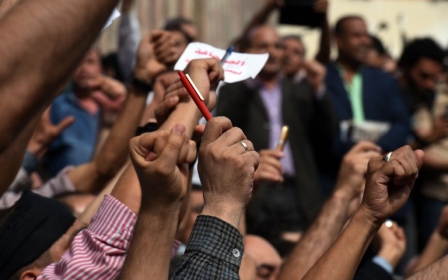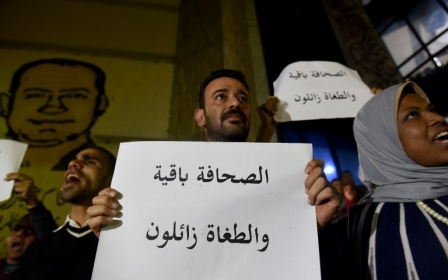Egypt's pro-Sisi TV stars are being taken off the air and no one is sure why

Egyptian TV personalities who have played a pivotal role in cementing the rule of President Abdel Fattah el-Sisi are feeling the heat, after several celebrity hosts were abruptly taken off air in recent weeks.
Speculation over why TV channels have abandoned talk-show hosts who have been their flagship icons for years and have long rallied for Sisi’s policies has been rife.
Several stars were reportedly transferred to other channels without warning, and sometimes without their consent. Others who are still in place have taken to the airwaves to speak out.
The sudden restructuring comes months after the country's General Intelligence Service reportedly purchased shares or full control of several privately held television and radio stations.
Some observers have attributed the hasty changes to an internal battle between Sisi's security agencies and advisors, or an attempt to snuff out political chatter.
But network managers have given only vague explanations and it is in that space that gossip has flourished, as well as panic among stars who continue to appear onscreen.
Mostafa Bakry, a pro-Sisi lawmaker, warned against the changes on his TV show on Al-Balad TV earlier this week.
“Disagreeing with you on something shouldn't mean staying home the next day. This isn’t right. So please, please, we want our country to stand on its feet, and we all support it. We have all chosen President Sisi. No one should ever question our patriotism,” Bakry said in an almost two-minute rant.
'Disagreeing with you on something shouldn't mean staying home the next day'
- Mostafa Bakry, MP and talk show host
“We have the right to breath, to speak, to talk. The media personnel who are sent to their homes: why is this happening? They will become time bombs. They will stand against the state. They’re 600-700 people. What is going on?” he exclaimed.
He named the prominent talk show stars Lamees al-Hadidi and Wael al-Ibrashi as examples of celebrities whose fates remain unknown after they were replaced or suspended.
The spectre of the country's intelligence services looms over the changing media landscape. Last December, Eagle Capital for Financial Investments, a private equity fund reportedly owned by the General Intelligence Service, purchased shares in Egyptian Media Group from businessman Ahmed Abu Hashima, according to a Mada Masr report.
The transaction left Eagle Capital as the sole holder of the media group, which owns ONtv and six other newspapers and websites, most famous of which is the privately owned Youm7 newspaper and website.
Similar acquisitions could be in the pipeline as Ahmed Bahgat, founder and owner of Egypt’s first privately owned channel Dream TV, dropped heavy hints in an interview on Tuesday.
“It is clear that the state’s stand, regarding the media issue, is that no one steers away from the flock. This is what is clear. Therefore there are partnerships with the private sector,” Bahgat said.
In response to a question about the future of the Dream Network which he owns, Bahgat said that “right now, we are in talks to form some sort of partnership with some state bodies”.The interviewer responded: “You were the last one we all had our bets on to remain independent.”
Bahey Eldin Hassan, director of Cairo Institute for Human Rights Studies, attributed the changes to an “internal strife between Sisi’s security agencies and advisors".
Egypt’s media scene has witnessed a period of stability since the 2013 coup, when the military-backed government shut down dozens of opposition outlets, mostly tied to the Muslim Brotherhood, and only allowed pro-Sisi voices to be expressed in mainstream outlets.
Since then, rare expressions of opinion out of favour with the government have been punished.
In April, the country’s most popular daily, Al Masry al-Yom, fired its chief editor over the newspaper’s coverage of the last presidential elections, which carried a report accusing authorities of influencing and mobilising voters through rewards.
'It is clear that the state’s stand, regarding the media issue, is that no one steers away from the flock'
- Ahmed Bahgat, owner of Dream Network
Mada Masr reported on 3 September that Lamees al-Hadidy, who hosts a popular talk show on the CBC satellite TV channel, refused to be moved to ONtv, another channel, and was replaced by another anchor minutes before she went on air.
The news website reported that sources in CBC said al-Hadidy will be allowed to "continue broadcasting on CBC under the condition that she would not be presenting live". Hadidy would be "allowed to host a weekly pre-recorded arts and society show that does not touch upon news or politics," according to the news website.
Several laws have been passed in recent months which tighten the state's grip on media outlets, including unprecedented constraints on social media.
The Commitee to Protect Journalists has ranked Egypt among the world's top three worst jailers of journalists.
The Egyptian embassy in London had not responded to Middle East Eye's request for comment by the time of publication.
Middle East Eye propose une couverture et une analyse indépendantes et incomparables du Moyen-Orient, de l’Afrique du Nord et d’autres régions du monde. Pour en savoir plus sur la reprise de ce contenu et les frais qui s’appliquent, veuillez remplir ce formulaire [en anglais]. Pour en savoir plus sur MEE, cliquez ici [en anglais].




